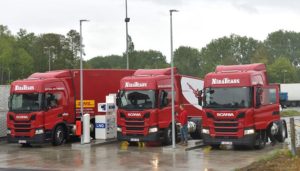 Ninatrans a family company founded 40 years ago that specializes in time-critical transport, recently started using another ten Scania's G 410 LNG. The company from Heverlee, Belgium, started using the very first Scania LNG in Belgium last year. "We can expand because there is now an LNG filling station nearby," says business manager Benny Smets.
Ninatrans a family company founded 40 years ago that specializes in time-critical transport, recently started using another ten Scania's G 410 LNG. The company from Heverlee, Belgium, started using the very first Scania LNG in Belgium last year. "We can expand because there is now an LNG filling station nearby," says business manager Benny Smets.
Until recently, Ninatrans's drivers were filling up gas in Antwerp. With the opening of the LNG filling station in Heverlee Noord along the E40 in the direction of Brussels, Ninatrans can refuel liquid gas at barely six kilometers from the company. The new LNG station is the first in Belgium at a gas station along a motorway.
The Scania LNG fleet from Ninatrans now has eleven vehicles. "With this purchase, we want to do our part for a better environment," says Benny Smets. "Because a gas engine emits less CO2 and less particulate matter." The Scania G 410 LNG has a lower CO2 emission of 15 to 20% when using natural gas and a reduction of up to 95 percent when using biogas. The gas engines are also quieter than diesel engines and Quiet Truck certified.
The trucks with gas engines are more expensive to purchase, and that may increase the total cost of transport. "But our customers consider that ecological transport is important," says Benny Smets. “That is why we negotiate an adjust price with them. The gas engine is currently the most advanced solution for driving in a more environmentally friendly way. "
In Belgium, trucks that run on gas pay a kilometer charge, just like trucks that run on diesel. "That is not the case in Germany," says Benny Smets. “There the gas trucks are exempt from Maut (Road Toll). The government could give the transport sector a boost by following the German example, so that more companies can switch to gas. "
The Scania G 410 LNG is powered by the OC13 six-cylinder engine with a torque of 2,000 Nm between 1,100 and 1,400 revolutions per minute. The truck has two LNG tanks - one of 400 and one of 340 liters and is equipped with the Opticruise automatic gearbox and a retarder.
Note from GGM: In many places, just as in Germany, total cost of ownership and operation for LNG trucks are lower than for diesel. The price of LNG , more often than not, is lower than the oil based fuels, and the natural gas trucks are able to make deliveries in areas where diesel trucks are no longer allowed. NG trucks are also allowed in noise-sensitive areas, as they comply with noise limits for those areas.
